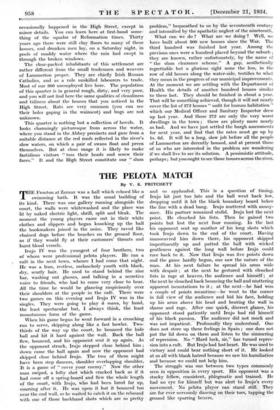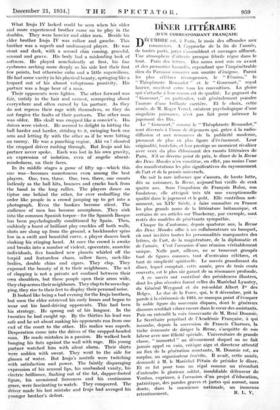THE PELOTA MATCH
By V. S. PRITCIIETT
THE Fronton at Zarauz was a hall which echoed like a swimming bath. It was the usual building of its kind. There was one gallery running alongside the court, the walls were whitewashed and the place was lit by naked electric light, shrill, split and bleak. The moment the young players came out in their white clothes and slippers and began knocking up the ball the bookmakers joined in the noise. They raved like chained dogs before the benches on the ground floor, as if they would fly at their customers' throats and burst blood vessels.
Irujo IV was the youngest of four brothers, two of whom were professional pelota players. He ran a café in the next town, whence I had come that night. He was a lean, restless, melancholy youth with black, dry, scurfy hair. He used to stand behind the zinc bar, washing out glasses, and talking in a secretive voice to friends, who had to come very close to hear. All the time he would be glancing suspiciously over their shoulders at the people in the café. There were two games on this evening and Irujo IV. was in the singles. They were going to play a inano, by hand, the least spectacular but, I always think, the least monotonous form of the game.
When his game began he went forward in a crouching run to serve, skipping along like a fast bowler. Two- thirds of the way up the court, he bounced the hide ball and hit it hard against -the wall. Back the ball flew, bounced, and his opponent sent it up again. As the opponent struck, Irujo stepped close behind him ; down came the ball again and now the opponent had skipped close behind Irujo. The two of them might have been step dancers, shoulder overlapping shoulder. It is a game of " cover your enemy." Now the other man swiped, a lofty shOt which cracked back as if it had come off a spring-board and flew the whole length of the court, with Irujo, who had been lured far up, coursing after it. . He was upon it but it bounced to near the end wall, so he waited to catch it on the rebound with one of those backhand shots which are so pretty and so applauded. This is a question of timing. Irujo hit just too late and the ball went back low, dropping until it hit the black boundary board below the line with a dead bang. Irujo muttered with annoy- ance. His partner remained stolid. Irujo lost the next point. He clenched his fists. Then he gained two points but lost the next four running. In the'. last his oppOnent sent up another of his long shots which took Irujo down to the end of the court. Having manoeuvred him down there, his opponent skipped impertinently up and patted the ball with wicked gentleness againgt the long wall before Irujo could race back to it. Now that Irujo was five poiritS 'down and the game hardly begun, one saw the nature of the man. At his next failure he spread his arms wide with despair ; at the next he gestured with clenched fists in rage at heaven, the audience and himself ; at the next he slouched back bouncing the ball and Muttering apparent incantations to it ; at the next—he hid won a couple of points meantime—he went to the corner in full view of the audience and hid his fabe, holding up his arnis above his head and beating the Wall 'in shame and rage. After one quick, discreet glance,' his opponent stood patiently until Irujo had rid himself of his black passion. The audience did not mock and was not impatient. Profoundly they understood. One does not store up these feelings in Spain ; one does not Put the lid down on them and listen to the 'simmering of repression. No " Hard luck, sir," has turned repres= sion into a cult. But Irujo had lost heart. He was usedto victory and could bear nothing short of it. He looked at us all with blank hatred because we saw his hunfiliatiOn and because we could not help him.
The struggle was One between two types commonly seen in opposition in . every sport. His opponent 'was a stocky fellow, consistent, phlegmatic and trained. He had no eye for hiinself hut, was alert to Irujo's every movement. No pelota player can stand still. They are for ever nervously dancing on their toes, tapping the ground like sparring boxers. What Irujo .IV lacked could be seen when his older and more experienced brother came on to play in the doubles. They were heavier and older men. Beside his elder brother Irujo IV was callow and gauche. This brother was a superb and undismayed player. He was stout and dark, with a second chin coming, graceful, sensual and grave. His body had a misleading look of softness. He played nonchalantly at first, his fine eyebrows arching more deeply as his side lost their first few points, but otherwise calm and a little supercilious. He had some vanity in his physical beauty, springing like a leopard out of his almost voluptuous passivity. His partner was a huge bear of a man.
Their opponents were lighter. The other forward was fair, untidy in the hair and earnest, scampering about everywhere and often cursed by his partner. As they do not repress their rage with themselves, so they do not forgive the faults of their partners. The other man was older. His skull was cropped like a convict's. His drives were violent. He seemed to delight in hitting the ball harder and harder, striding to it, swinging back one arm- and letting fly with the other as if he were hitting an enemy. He was a punching engine. Ahi va ! shouted the cropped driver rushing through. But .Irujo and his partner never spoke. Each was lost in his own gravity, an expression of isolation, even of angelic absent- mindedness, on their faces.
In its middle stages a game of fifty up—which this one was—becomes monotonous even among the best players. One, two, three. One, two, three, one counts listlessly as the ball hits, bounces and cracks back from the hand in the long rallies. The players dance on tiptoe one behind the other, for ever reshuffling the order like people in a crowd jumping up to get into a photograph. Even the bookies become silent. The audience of men has become amorphous. They sink into the common Spanish torpor—for the Spanish Basque has been psychologically conditioned by Spain. Then, suddenly a burst of brilliant play crackles off both walls, shots are slung up from the ground, a backhander spins low in a swift and beautiful curve, a player dances back shaking his stinging hand. At once the crowd is awake and breaks into a number of violent, egocentric, anarchic individuals, five hundred new planets whirled off the torpid and featureless chaos, sallow faces, sack-like bodies, double chins and cigars. They clap. They expound the beauty of it to their neighbours. The act of clapping is not a private act confined between their own shoulders, but these people open their arms wide, they clap across their neighbours. They clap to be seen clap- ping, they rise to their feet to display their personal noise.
It looked like being a bad evening for the Irujo brothers, but soon the elder retrieved his early losses and began to wear out his hard-driving opponents. This had been his strategy. He sprang out of his languor. In the twenties he had caught up. By the thirties his lead was safe and he set about making his opponents run from one end of the court to the other. His malice was superb. Desperation came into the drives of the cropped-headed min. He made mistakes in a passion. He walked back banging his fists against the wall with rage. His young partner watched him with silent alarm. Their shirts were sodden with sweat. They went to the side for glasses of water. But Irujo's nostrils were twitching with satisfaction and power. The faintly disparaging expression of his sensual lips, his unabashed vanity, his electric brilliance, flashing out of the fat, dapper-footed figure, his occasional fierceness and his continuous grace, were fascinating to watch. They conquered. The driver made his last mistake and Irujo had avenged his younger brother's defeat.



































 Previous page
Previous page